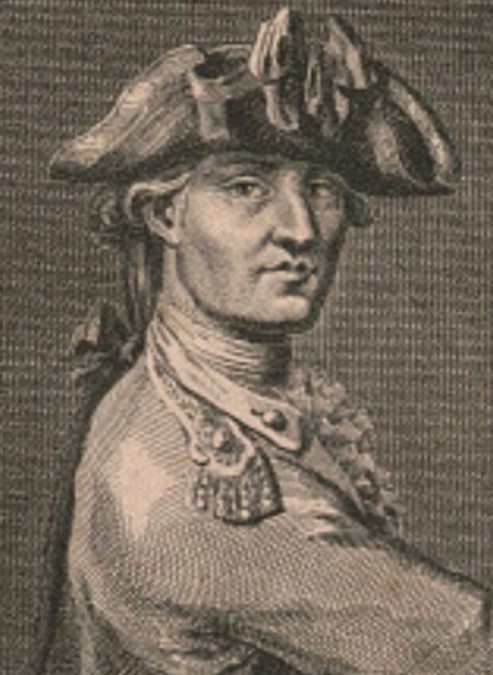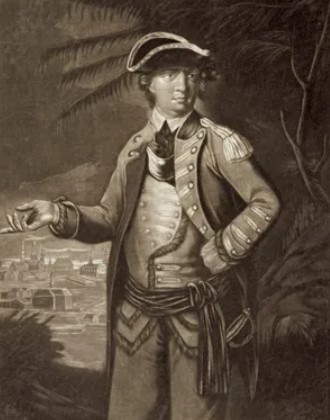Benedict Arnold: A Traitor Hero

Benedict Arnold has a new book out. It is a striking treatment of a man who has been termed “the most hated man in America.” We have never seen a picture of him, since his time predates photography. The etching above was a “first seen” for many of us. Arnold is a complex figure in his time- born in the middle-days of the 18th century in the British colonial system in North America, he became an officer in the Patriot uprising against it. He served until he defected to the British. That betrayal is his legacy to our times, and largely ignores his significant a priory acts of bravery in the cause of freedom.
Former Continental Army Major General Arnold died in London in 1801 after his name became an epithet for “traitor” in what became the United States. There is more to Arnold’s tale, and the new book “God Save Benedict Arnold” by historian James Kelly outlines some of the complexities of a period that needed villains as much as heroes.Arnold was useful in both roles.
This is not intended to start our day with a blast shouting “Arnold was a Hero! You have been misinformed!” As we all know, there are differences between the “official” and “true” accounts of events. Dr. Kelly outlines some of the ones that made Arnold a hero for half a decade. They include combat heroism inconvenient to a necessary tale of a perfidious scoundrel. Given the circumstances of our time in which “truth” has become only a part of the popular story this is a striking tale of how things actually worked in these fractious colonies.
It was a remarkable story that would have featured Arnold as a gallant soldier with the renown of Ethan Allen, with whom he rode in the successful colonial attack on British-held Ticonderoga. We still name naval ships about that fight. The following month he was appointed by Gen. Washington to command an expedition to capture Quebec. The story of that campaign is memorable, but sadly we do not name ships after it. Arnold marched 700 volunteers north through the wilderness of Maine to Canada and attack the British force which had occupied the former French colonial capital in 1759, as part of what was known on this side of the Atlantic as “The French and Indian War.”.
The expedition was a remarkable demonstration of determination. Supported by General Richard Montgomery, Arnold’s force attacked the fortified city. Some of those stone walls remain today, adamant and still strong. In the combined assault in the bitter cold of December, 1775, the Minutemen were defeated. Montgomery was killed outright and Arnold was severely wounded.

Benedict Arnold
Based on his performance and recovery from wounds, he was promoted to Brigadier and he directed construction of flotilla of vessels on Lake Champlain, New York. On that somewhat constricted body of fresh water, his force inflicted severe losses on a greatly superior enemy fleet near Valcour Island, New York, in October of 1776.
He returned from the lake a hero, a Continental Army officer whose Navy had beaten the strongest maritime power on earth. Kelly reports in his new book that not all of Arnold’s enemies were to the front of him. His rash courage displayed in repelling a Royalist force at Danbury, CT, resulted in his elevation to Major General in a temporary grade. His impatient energy aroused the enmity of other Continental officers. When the Continental Congress authorized five new “permanent” Major General positions in this month- February of 1977. Arnold was passed over for five officers junior to him and he reverted to a Brigadier’s rank..
He naturally had a certain amount of resentment to the obvious snub, and only the personal plea of General George Washington sufficed to keep him in the active Continental force. Continued tension in the officer corps led to another resignation, but he accepted a government order to help stem the British advance into upper New York.
He won a victory at Fort Stanwix (now Rome) in August of 1777 and commanded advance battalions at the battle of Saratoga that Fall, fighting brilliantly until seriously wounded again. For his services in that campaign and recuperation, he was restored to his proper relative grade as a Major General.
Crippled from his wounds, Arnold was placed in command of the city of Philadelphia in June of 1778. While in charge, he socialized with families of loyalists and lived extravagantly. In order to support his lifestyle, he violated several state and Continental regulations, arousing resentment and suspicion in Pennsylvania’s Supreme Executive Council. Charges were then referred to Congress, and Arnold asked for an immediate court-martial to clear himself.
We thus arrive in Arnold’s life to the treasonous part. He married Margaret Shippen in April of 1779. She was a loyalist girl whose name has not transitioned to ignominy with her husband. She may have contributed to a new family need for quick cash. Early in May of that year, war raging, Arnold decided to trade his impending command of the Colonial fort at West Point to the British for $20,000 dollars.
In today’s terms, that would be nearly the equivalent of million bucks. We asked around the circle on The Patio, since Splash had seen an ad for the new book. We decided to delve into some of the more interesting aspects of how our country came to be. James Kelly tells it in a fine book that outlines some of the calculus of public opinion in a struggle between King and country. What we forget is the rule of thirds. Some say that only a third of the population were revolutionary in spirit. Another third were loyal to the King, with the remaining third in the “independent” category, looking for advantage or peace.
Those divisions seem to have returned to us these days. The two major parties are bitterly opposed, and another declares themselves open to the best deal available. We think James Kelly’s new book helps us understand a little about the traditions that are endemic to our continent. It is an eye-opener about America’s first traitor. At least, the one we remember!

“A dazzling addition to the history of the American Revolution.” ―Kirkus Review
“Finally… a full and fascinating portrait of a true hero of the American Revolution, until he was visited by villainy. A riveting read.” ―Tom Clavin, New York Times bestselling author of Follow Me to Hell
Benedict Arnold committed treason― for more than two centuries, that’s all that most Americans have known about him. ‘GOD SAVE BENEDICT ARNOLD.” It is published by McMillan, a fine traditional publisher. We got our copy on Amazon.
Copyright 2024 Vic Socotra
http://www.vicocotra.com
